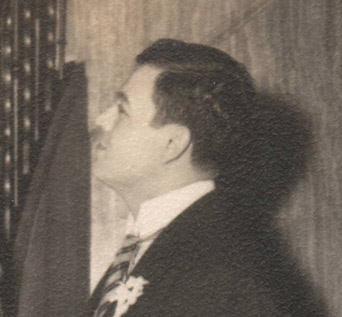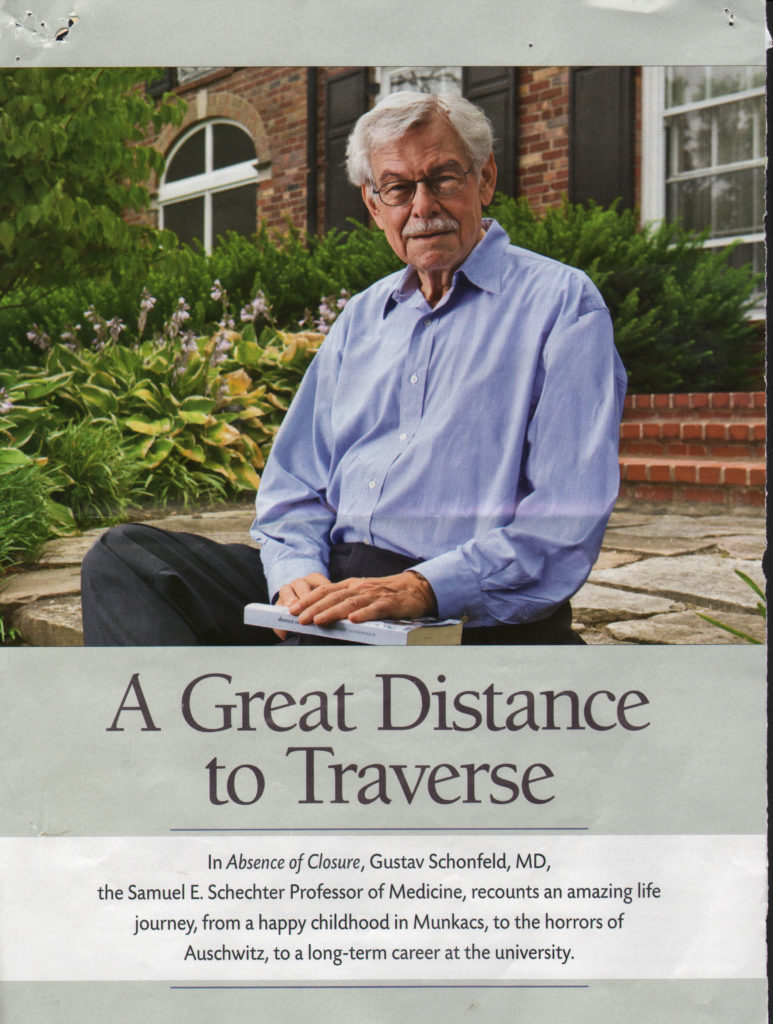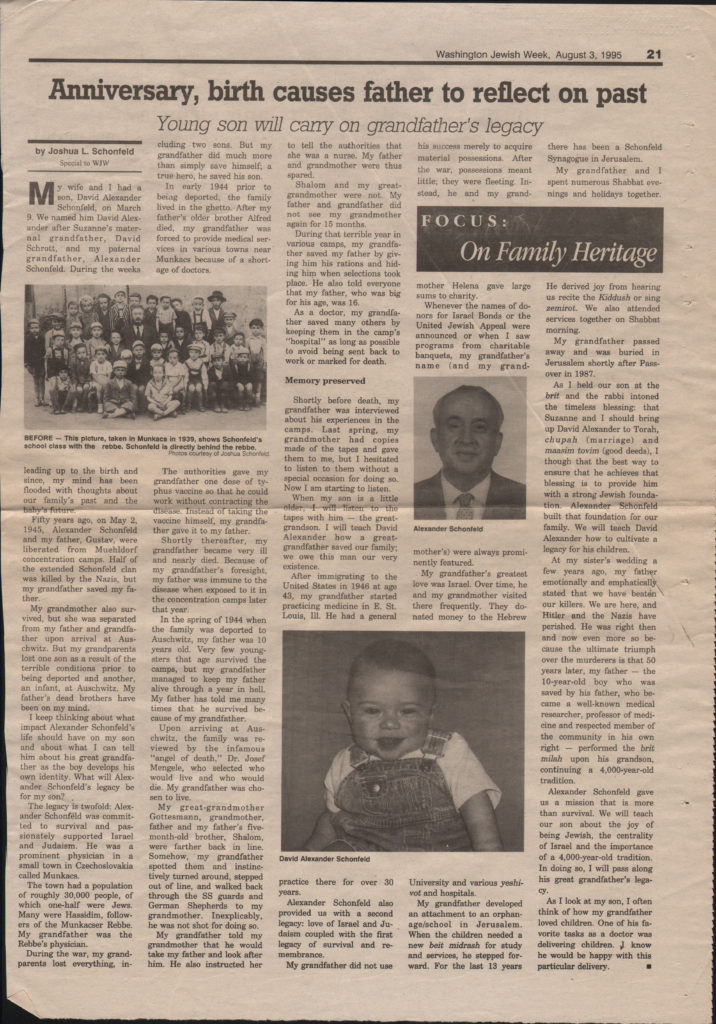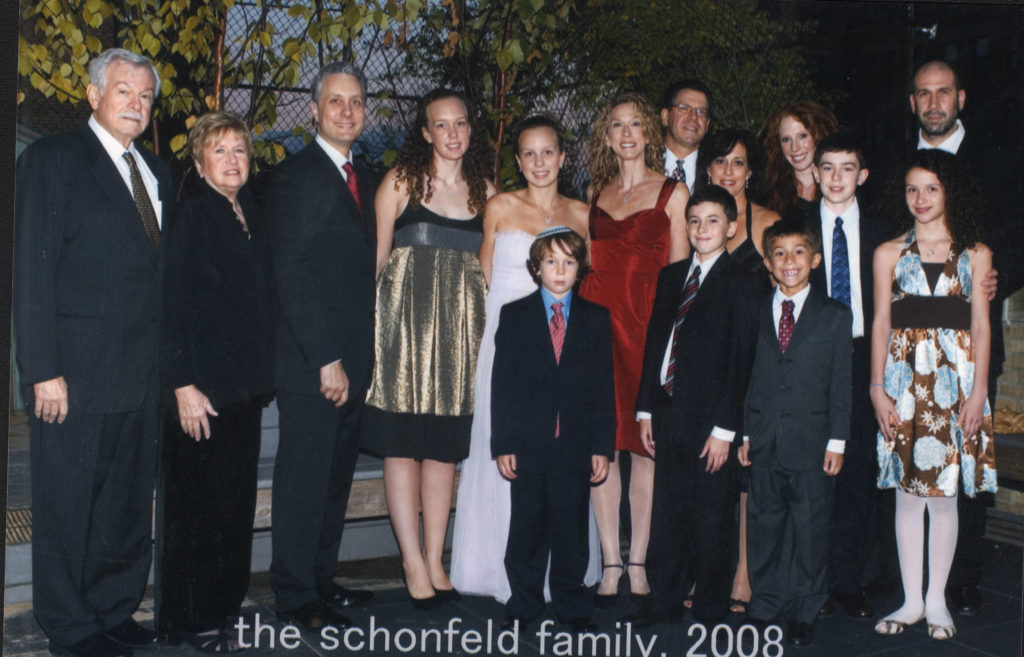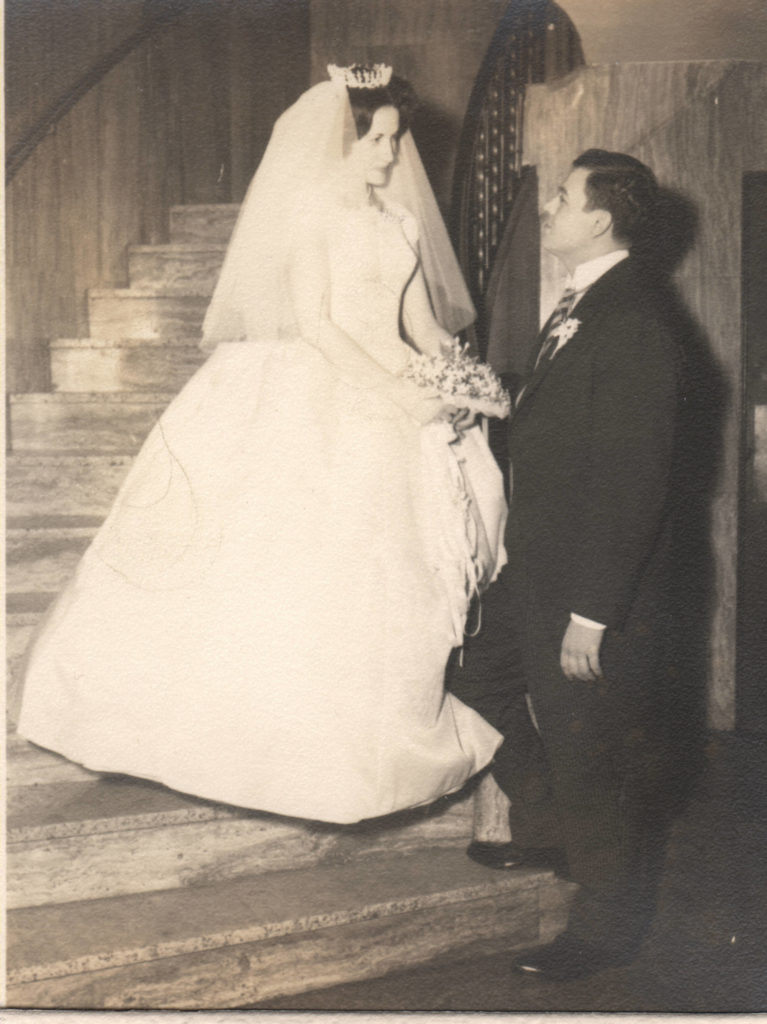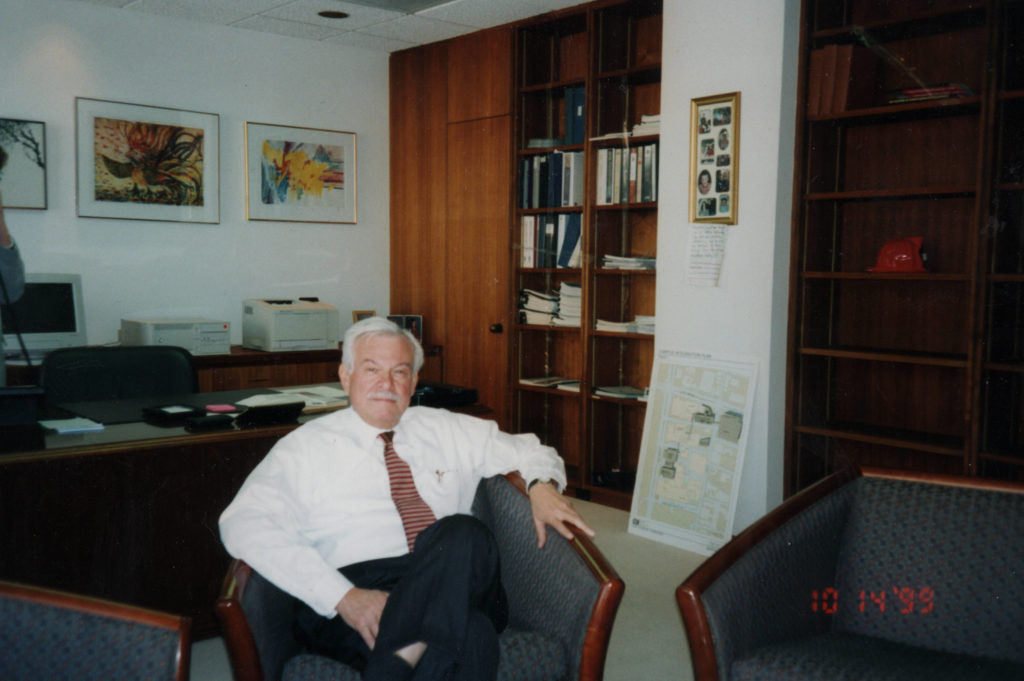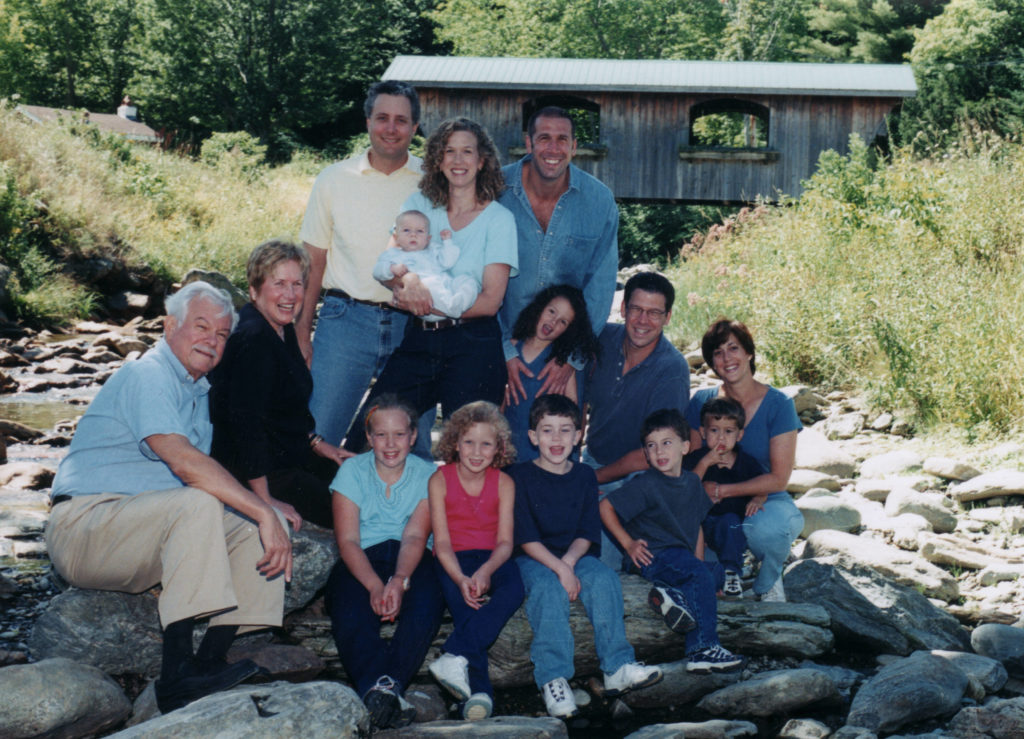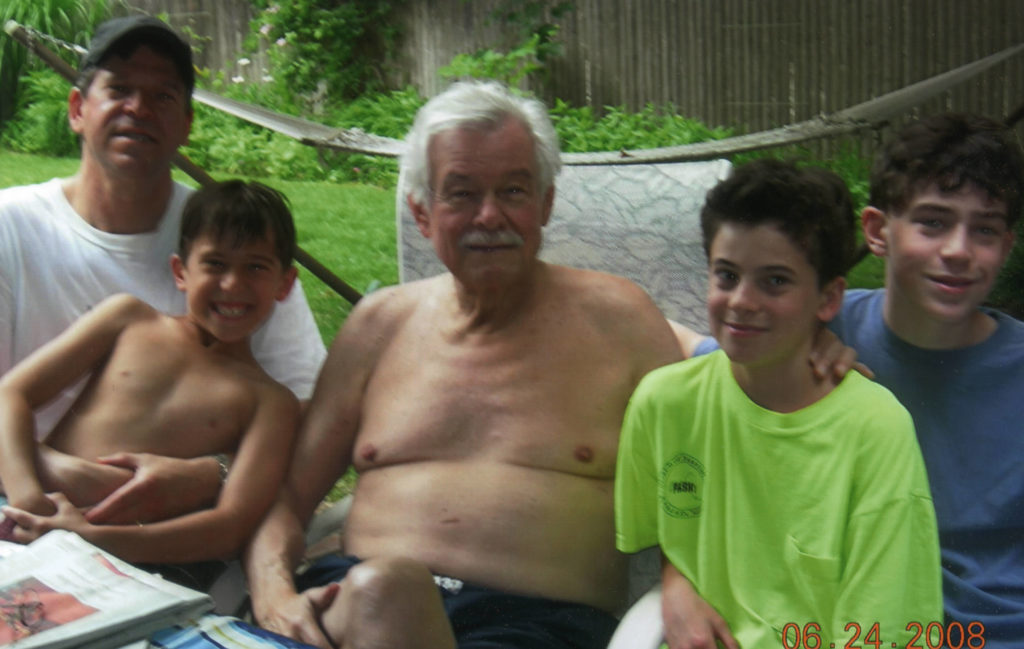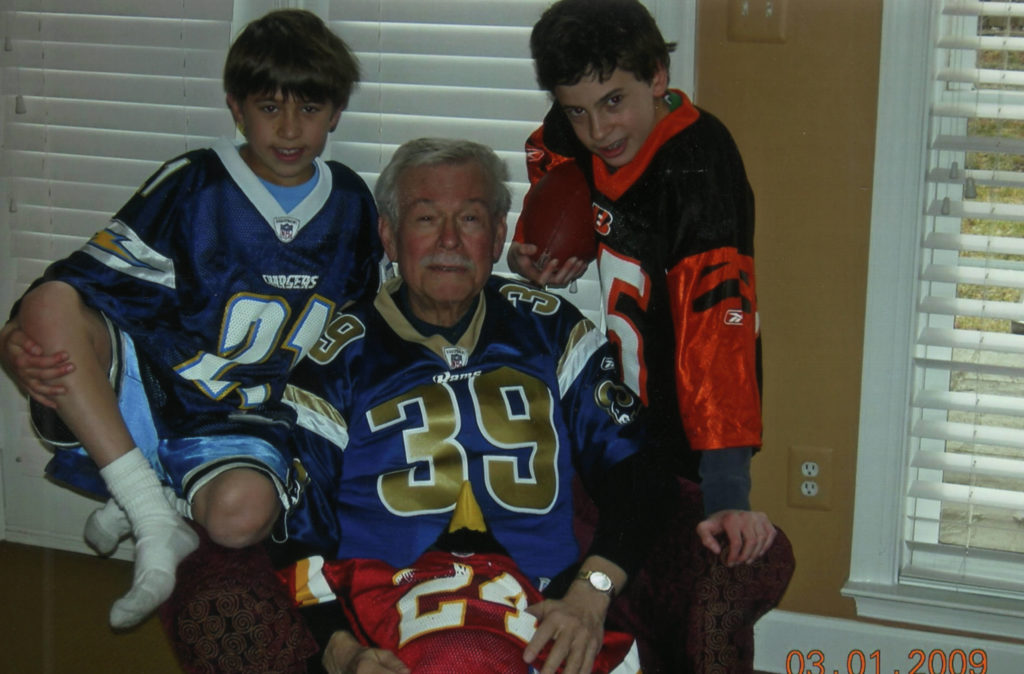The rest of the Hungarians, I suppose the men, were drafted and had to go fight the Russians. There were specific, I mean the specific things that were placed on the Jews were these labor battalions that they had to go into where they weren’t allowed to…I’m not sure that many Jews would have wanted to fight for the Hungarians but they weren’t given the opportunity to fight as the rest of the population was given to fight. And then there were these financial restrictions and this business about my father having to go and work in a village, I think was sort of in lieu of the labor battalion and we were very thankful that that’s all he had to do.
BURDE: And you continued to go to school?
SCHONFELD: Yes I continued to go to school, all the time, and my own every day life was not particularly disturbed. I mean, I didn’t feel these terrors or horrors that were felt by the Polish Jews and so on much earlier in the war. The situation for us really didn’t get terrible until the Germans came into Hungary. That’s when the things really started moving fast and furious. That took place in about March of 1944. And I remember the day very vividly because a whole, huge column of German armored infantry just moved into the city. And the armored infantry also included a lot of SS men and the SS men wore these, you know these vests, had symbols on their hats and on their lapels and they wore black uniforms and they were very frightening. The Wehrmacht looked like most other people but the SS men, you know, looked like they were killers. And they came in with their personnel carriers, and with their tanks and so on. And very soon after that we had to start wearing a Jewish star and then within a matter of, I don’t know, a couple of weeks it seems like, we were all herded into a ghetto, Munkach, well one part of Munkach was declared to be the ghetto. And all the Jews had to move into that ghetto and it probably was like in April of 1944 and that was the time at which 10 families moved into our house. We went from a one family residence to a 10 family residence. And in a way it was kind of lucky because my father, at that time, again was called to go serve in another village. So for the six or eight weeks between the time that the ghetto was started and the time that the people were deported to Auschwitz, we spent most of those few weeks in this village rather than living with the 10 families in our own house because that must not have been terribly pleasant under those crowded conditions. And in that village we lived in somebody’s house and I remember a couple of old maids living in that house and we lived with them and they treated us with kindness and my father was a physician for that village. And then in May, late in May, I remember some Hungarian police, state police, gendarmes came after us and took us into the, not even into the ghetto anymore, but into a brick factory. We were taken not to our house but to a large brick factory which had a direct rail line running into it. And in that brick factory was where all the Jews were. That was the place from which they were loaded into the cars and taken to Auschwitz.
BURDE: So you never even got to go back to your house.
SCHONFELD: No, no, we went directly from the village to this brick factory.
MIRIAM: When was it that time when you think you overheard your parents talking about the possibility of committing suicide?
SCHONFELD: That was in that village. There were some people in Munkach who when the ghetto was declared, committed suicide. And the people…the people I remember best was a dentist and his wife and daughter and she was a classmate of mine in school and a very lovely girl. I guess she was my first love and I remember that before we even went off to that village, the word got around that they had committed suicide.
BURDE: The whole family?
SCHONFELD: Yeah. And then I remember while we were in this village overhearing one night, sorta in the middle of the night, I woke up and heard my parents talking about committing suicide and I told them that I didn’t want to die. And so that closed that subject. I think by that time, it must have been clear to people what was going on. You know, I was never told what was in the offing and I don’t really know to what extent people knew what was in the offing. I think most Hungarian Jews wanted to believe what we were told, namely, was that we were not being rounded up to be taken to Auschwitz but we were being rounded up to be taken into the interior of Hungary, to labor camps.
BURDE: Then Auschwitz was a known entity at that time?
SCHONFELD: I really don’t know. I don’t know whether the adults knew about it or whether they knew about it as a place or not. I’d never heard the word. I don’t remember ever hearing the word before we actually went there. But what we were told by the Hungarian gendarmes and most of the gathering of the Jews, you know, from their homes and herding them into ghettos and so on was done by the Hungarian police; it was that we were going to be taken to do some work and build some things for the Hungarians because they needed the work. And I think most Jews wanted to believe that.
MIRIAM: Your mother told me, she told me, they must have had some idea because…she took a pillow case and filled it full of money and wanted you to have it…she spoke to some of the Hungarians that she knew and asked them to take her baby.
SCHONFELD: I think she wanted those two ladies we were living with in that village…
MIRIAM: She asked someone to take the baby. She gave them all this money. They took the money but they never came for the baby, so she must have had some idea of whatever would happen, the baby wouldn’t…
SCHONFELD: Yeah, I remember a conversation between my father and the, I think he was head of the electrical company in Munkach, trying to persuade him to take us, the children, it was the baby and he refused to do so. So I think those non-Jews who took Jewish children, put themselves in some jeopardy and there weren’t too many of them who wanted to do that. So we were in this brick factory for, I guess a few days or maybe a week and that was the first time I ever ate non-kosher food, was in that brick factory. And I remember my mother brought a ham with her from this village and she offered me some ham to eat and I said, “Can I eat it?” And she says, “Well, there isn’t anything else to eat and you’re not allowed to starve and if there’s a question of starvation then you can eat non-kosher food.”
BURDE: So the individual families had their own food?
SCHONFELD: Yeah, there was no kitchen or anything, you had to bring your own stuff. And so we were in this brick factory for about a week. I remember, I remember some stories in the big factory itself. We slept on the ground, but I remember other people telling stories of what it was like for those few weeks that we were gone when we were in that village and how it was that the Jews were rounded up. And our old neighbor whose…there was a family also called Schonfeld. They were not related to us but they were right next door neighbors and there was a grandfather and two of his children and their families living in a courtyard. And one of the children’s children, who was my age, was a classmate of mine and he was my best friend. You know, we were next-door children and we were always together. We went to school together and played together a lot. I was either always at his house, he was always at my house and the story was told that his grandfather got shot by the police on the way to the (BELL RINGS)…because he didn’t move fast enough while they were being taken to that brick factory.
BURDE: But it was by the Hungarians, not by the SS.
SCHONFELD: By the Hungarians. I think the SS just sort of stood by and sort of were in the background but a lot of the dirty work in Hungary itself was done by the Hungarian police. So after we were there for a week, then we got loaded onto these cattle cars and they loaded, I don’t know, a hundred people or something like that into one cattle car. And I just remember it, sort of as a, you know, as a half way dream or nightmare being in that car. I can’t remember many details except that it was very crowded and suffocating and it stank and it was very unpleasant and after that we arrived to Auschwitz and in Auschwitz itself, we got off the train and that’s when I first saw the SS and their dogs. I mean I saw the SS in Munkach but the whole schmear with the dogs, you know, the German Shepards. And they were screaming at us to get in line and to march and to, you know, this kind of thing, and they would pummel people who didn’t move fast enough. And as we got out of the cars we were told to leave all our valuables by the side and that anybody who was caught with any kind of valuables further on would be shot.
BURDE: How did you have valuables with you if you were not coming from home?
SCHONFELD: Well I mean a few valuables…rings, earrings, you know, things like that…people carry with them. But we were told that if we had anything like that, that we would be shot so people threw stuff away. My mother told me that whatever she had with her, her rings, earrings, whatever, she just threw away. And the thing that I had that was the most precious possession that I had in those days was a small stamp collection and I remember I threw that away (LAUGHTER) because I was afraid that if, you know, that had any value, I’d be shot for that. So there were a bunch of SS men standing up some ways at the front of the train there and we started marching towards them. And in the middle of this line was a guy with a black coat, you know, these SS guys had these very elegant black leather coats with the black boots and the officers had their riding crops, you know. And so we were told that those people who could walk, felt that they could walk about 10 kilometers, should go to one side and those who felt that they couldn’t walk, should go to the other side, should go in one direction and the other people should go in the other direction. My father, for some reason, that he still can’t explain to anybody but he took my little baby brother and gave him to my grandmother, my maternal grandmother was living with us at that time. She had been widowed about a year before that and she was staying with us. And she was in her middle 50s and he was seven months old and my mother was, I don’t know, maybe 31 and my father was maybe 41 and I was 10. And so he gave the baby to my grandmother and said, “You take him and I know you’re going in that direction.” And the three of us walked up to the line and the guy up there said, “This boy should go on the other side because he’s not going to be able to walk.” And my father said, “No, no, he’s 16 years old and he’s a strong boy, let him come with me.” And they said, “Okay.” So that’s how I happened to go with the others. And once we moved over to the side of the living, they separated the men from the women and so the last time I saw my mother was until after we saw each other after the war was over…I was in that place as we got off the train.
BURDE: Right as you arrived.
SCHONFELD: Right as we arrived and…
BURDE: How many people do you suppose arrived at the same time. Was it hundreds, was it thousands…
SCHONFELD: I would guess hundreds. I don’t know, I don’t know exactly but it was a train that had, you know, a number of cattle cars. I don’t know how many, maybe 20, 30 cattle cars and there were probably like, I don’t know, a hundred people in a car or so, you know, several hundred maybe, a couple thousand.
BURDE: And did it…so that you went to one side and did they reject anybody who tried to go to that side?
SCHONFELD: I don’t remember. I just remembered it as being chaotic and being very, very frightened because there was an awful lot of screaming going on and the dogs were running around and the SS were hitting people and los, los, you know go, go, move and you know, that sort of thing. So it was a very frightening experience because, you know, I mean we had sort of been spared all of that because we were in this village so we had been spared the few weeks of really nasty treatment before, beforehand. And so we sort of got on the train and after something like three hellish days we got out and we were in hell and it come from something that hadn’t been quite so terrible, you know, we were just in this village. And so it was very frightening and I remember just going off with my father and I don’t even remember whether I kissed my mother goodbye or if I had a chance to do that, or not, and we wound up in Auschwitz. And the other thing that I remember, of course, was this stink of burning flesh because that permeated Auschwitz. You could just smell the burning meat and I didn’t know that it was human beings at that time, it was just this terrible stink.
BURDE: Day and night?
SCHONFELD: Day and night, all the time, and you know, the soot coming out of the chimneys. And so we spent something like two and a half or three weeks in Auschwitz. In Auschwitz itself, we really didn’t do much. I mean, I remember of being assigned to do a little bit of shoveling in front of our, in front of our cabin. There were these rows of cabins where people slept on shelves, they were wooden shelves, you know, like bunks, but there were like a dozen people on each level. And that’s how we slept. We didn’t get much to eat. And I remember just being sort of in a fog most of the time, you know, just being very afraid and I was asked…I mean I was told that I had to do some shoveling there in front of the thing. There were these little, these little “v” shaped, “v” shaped little cars that ran on tracks, you know, like we use for hauling sand around or coal. And there were some of those and the earth was being moved back and forth. I don’t think it was any purposeful kind of activity, I think we were just digging holes and filling holes. But I remember one time when I was shoveling, some guy running at me with a shovel and swinging at me with a shovel and if I wouldn’t have ducked, he would have killed me. I don’t know why he did it; to this day I don’t know why. The other memory I have of Auschwitz, of course, aside from this unrelieved gloom and the electrical fences and the guards and the dogs and the stink of the burning, and this tremendous crowding and being shaved…the head shaved, you know, and my first pair of long pants, you know, kids in Europe don’t get their long pants. It was my first pair of long pants with the blue and white prison clothes. We were not tattooed. We did have a number but the Hungarian Jews were not tattooed so I don’t have a tattoo. In addition to that were the latrines which were these huge latrines that the guys would squat over boards and the smell of this disinfectant that they use to…lime I guess…that they use to throw into the latrines and that was also an awful smell.
BURDE: Were the latrines outside?
SCHONFELD: No, they were in buildings and they were just latrine buildings. And the other very striking memory I have is at the end of the latrine one day, there was sort of like a closet or a boarded-off area and I wanted to see what was behind that area…behind those boards. And I looked through the slats of the boards and there were bodies piled up there, there must have been dozens of bodies that looked like, you know, just like you see the pictures of concentration camp bodies, you know, starved, emaciated white bodies, just stacked like cord wood. That was kind of a shock. So we spent a couple of weeks like that and then we were loaded onto wagons again into railroad cars and we were taken to Warsaw. And this was after the Warsaw ghetto fighting was all over and there was a concentration camp in the ghetto itself. And the job of the ghetto, of the camp, was to clean up the ghetto and try to salvage the ghetto…and to use and to salvage whatever building materials, bricks and building materials that could be salvaged from the destroyed buildings and ship them back to Germany. And so that’s what we did. And we spent something like two months there and then the Russians started coming close and we were taken away. We did something like a 120 kilometer walk from Warsaw to Kutno, this was in August I believe, in 1944. And during the course of this walk, quite a few people died. What the Germans told the people before they started walking, again, was the same trick. Those people who felt that they couldn’t walk, would be put into trucks and so this was an “out” for the big lineup, you know, they would line up all the people and count them, I think this was done every morning, and count them. But in one of the lineups, when we were told we’d be moving out, this was what we were told. And so a bunch of people stepped over to one side and the rest of us started marching and then we heard a lot of machine gun fire, so I assume that those people were shot. I didn’t see it, but that’s my assumption. Yeah?
BURDE: How did you happen…then just assume to – did you know that was going to happen, or did you just…
SCHONFELD: Well by that time we had met old prisoners, prisoners who had been in the camp for a while, you know, like the Polish Jews, Czechoslovakian Jews who had been in the camp for a year or two. They told us that you know, that…don’t do that because those people who show any sign of weakness are just shot or taken away to be killed and you should try to stay in the working part of the camp population for as long as you can.
BURDE: I just have one more question. How long were you in Auschwitz?
SCHONFELD: Something like two to three weeks.
BURDE: Did you have the same routine of having checks every morning or evening? How did a day run?
SCHONFELD: We had to line up in the morning and the SS would come around and count you or the kapos would count and report to the SS. And there was a lot of yelling back and forth and sort of military, you know, type of activity about lining up and keeping a straight line. And then there would be some work, I mean, there would be breakfast which ordinarily consisted of some thin soup or some black coffee or, you know, a crumb of bread or something like that. Then there would be work. I don’t even remember what the other guys did, I just remember, I did the shoveling. I don’t remember what my father did…
BURDE: Did you have shoes or did they take them away?
SCHONFELD: No, I had shoes. I don’t remember whether they gave us shoes or whether I got to keep my own shoes. I know they took away all our clothes. They gave us…they shaved our heads and they gave us these prison clothes, but I don’t remember about the shoes.
BURDE: And then at night again…
SCHONFELD: At night, then, you know, there were meals. We had to line up for meals and they were usually doled out of these big pots. In Auschwitz, I think they were in the cabins themselves. The cabins were these huge affairs, long affairs and they were, and we just lined up for our food and then after dinner, I think people would just sit around and eventually people would go to sleep. It was the time to go to sleep.
BURDE: Was there any sort of, community life? Did people talk…did they sing, did they…
SCHONFELD: I don’t remember any singing, there was talking.
MIRIAM: All this publicity and stuff about the music in Auschwitz and the orchestra in Auschwitz. Did you see that?
SCHONFELD: No.
BURDE: Were there any others your age or who seemed to be young?
SCHONFELD: I was the youngest in just about every place that I was. I don’t remember…
BURDE: And were you with your father?
SCHONFELD: Yeah. I was with my father throughout the whole thing and with this one cousin and a couple of uncles. Yeah, we went through the whole camp together. I mean the whole time we were together.
BURDE: Then were there other people from your town, or…
SCHONFELD: Yeah, I don’t…to tell the truth I don’t remember the other people. I remember my cousin. I remember my uncles and I remember my father. The other people were just sort of shadows.
BURDE: Did anybody get sick, like…
SCHONFELD: I don’t remember anybody being sick in Auschwitz, I remember in Muehldorf, the last place where we were, people got sick.
MIRIAM: (CANNOT HEAR)…march…
SCHONFELD: Well the march was a forced march from Warsaw to Kutno and in Kutno we got into trains and we were taken to Dachau. The march to Kutno was in August and it was very hot. We didn’t…we weren’t given any food, we weren’t given any water to drink, and people who lagged behind were shot. It was just as simple as that…you couldn’t keep up with the march and you just got shot. And I remember my father dragging me along, and this kind of stuff. I remember one time we came to a river. I don’t remember what the name of the river was and they sat us down on the bank of the river. There was a large sort of gravely area and we pled with the Germans to let us go in the river and drink some water and a few people got up and started running and they shot them. And I remember my father begging a German soldier to let…to let me have some water and he, you know, he hit him with the butt of the rifle and knocked him down. And that’s…that’s the way they were. You know it obviously was a deliberate attempt to kill people, not to make it easy for them to march or to get to where it was that they were taking them but to kill as many of them off along the way as possible.
BURDE: What was the purpose of the march?
SCHONFELD: Well, to get us away from the Russians. Because I don’t remember exactly when theWarsaw uprising took place, you know, when the Poles started the uprising and the Russians waited for the Poles…for the Germans to kill off all the Poles before they came into Warsaw, you know that story. That was a pleasure, I really enjoyed that story.
BURDE: So that the Russians…
SCHONFELD: Well the Germans took care of the Poles.
BURDE: So the Russians didn’t have to.
SCHONFELD: So the Russians didn’t have to, (LAUGHTER) yeah. But anyway, that’s what we were taken away from, the Russians were getting close. And so one night we camped on a big field. I remember a whole bunch of us, just the whole field covered with people who were doing the walking. And some Greek Jews started digging in the ground with their…we had metal dishes to eat out of, those were Boy Scout dishes to eat soup out of and stuff, and these Greek Jews started digging in the field and a couple of feet down, they found water. It was like a miracle from God and so then of course everybody else started digging and pretty soon there were lots of little wells in the field and the people got some water and it was muddy water but it was water. So I’m sure a lot of peoples’ lives were saved because that water was found. And the Germans were furious. They would come along and they would try to kick the wells closed, you know, and kick the wells to muddy them up and to try to fill them. They couldn’t stand the fact that the goddamn Jews had found some water.
BURDE: But they didn’t machine gun mobs of people, or…
SCHONFELD: No, no. For doing that? No.
MIRIAM: They would have had to kill everybody.
SCHONFELD: They would have, you know, had to kill lots of people. No, they didn’t but and then I remember, we finally got to a place, some kind of a forest where it rained a lot and then they put us into these trains. And then after a few days, I don’t know exactly how long, we wound up in another concentration camp, where each camp which was sort of reminiscent of Auschwitz but I think it was a little more closer quarters than things seemed to be paved a little more than Auschwitz. And I was told that we were in Dachau. And we stayed in Dachau again for maybe a week or two, not very long and they deloused us and gave us some showers and things like that. Then they put us into some more trains and we wound up, they sent us to a place called Muehldorf which was near Munich, I guess not very far from Dachau itself. And Muehldorf Waltlager which was a camp in a big forest where the Germans were trying to build an underground airplane factory and that’s why this camp was established…for the purpose of that. So it was a working camp, it was not an extermination camp, and we stayed there for the rest of the time. We stayed there from, I don’t know, approximately August until we were liberated on May 2, 1945. And there I did a variety of jobs. They started me off in the kitchen peeling potatoes and that wasn’t so bad because I could steal a lot of potatoes and take them back to my relatives. I would put the potatoes into my pants leg, I would tie my pants leg, you know with a string and put the potatoes into the pants leg because if you were caught stealing potatoes, it wasn’t…


